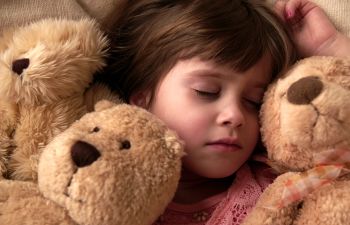
Anytime sleep apnea is mentioned, the image that usually comes to mind is an overweight adult who snores loudly and has very irregular breathing. While this picture is accurate to a great extent, obstructive sleep apnea (OSA) is not just limited to adults. Children can also have this sleep disorder.
Obstructive sleep apnea is not uncommon among children. In fact, from 3-12% of children snore and approximately 1-10% percent of children are affected by obstructive sleep apnea. Most children who have this sleep disorder have mild symptoms and will outgrow it. However, for those who have untreated OSA, the consequences can be alarming. They include:
- Failure to thrive
- Attention-deficit disorder
- Behavior problems
- Poor academic performance
- Cardiopulmonary disease
- Bed-wetting
Childhood obesity is partly to blame for many cases of pediatric OSA; however, in children, the most common underlying condition is enlargement of the adenoids and tonsils.
Symptoms of Pediatric OSA
If your child has these symptoms during sleep, pediatric OSA may be the cause:
- Pauses in breathing
- Snoring
- Restless sleep
- Snorting, coughing or choking
- Mouth breathing
- Nighttime sweating
- Bed-wetting
- Sleep terrors
Keep in mind that children with OSA will not always snore. Sometimes they may only have disturbed sleep. There are symptoms of OSA that can manifest when the child is awake. These include:
- Poor academic performance
- Difficulty paying attention
- Development of learning problems
- Behavioral problems
- Poor weight gain
- Hyperactivity
Early diagnosis and treatment for pediatric OSA is important. If it is not addressed, serious complications can develop, such as failure to grow and/or heart problems.
Diagnosis of Pediatric OSA
Pediatric OSA is diagnosed similarly to adult OSA. There will be a physical examination and a medical history will be reviewed, along with your child’s symptoms. There may also be an examination of the adenoids, tongue, mouth and neck. Several tests may be required for an accurate diagnosis. Your child may undergo a polysomnogram, which is part of an overnight sleep study. Sensors are applied to the body to measure brain wave activity, breathing patterns, snoring, oxygen levels, heart rate and muscle activity during sleep.
The doctor may also choose to do an electrocardiogram to measure the electrical impulses given off by your child’s heart to identify any underlying heart condition.
Once a diagnosis has been made, the doctor will develop a treatment plan. Depending on the results of testing you doctor may recommend:
- Medications
- Removal of the adenoids and tonsils
- Positive airway pressure therapy
- Oral appliances
Pediatric OSA should be diagnosed and treated as early as possible so that it will not have a negative impact on your child’s well-being.
If you suspect that your child is suffering from pediatric OSA, contact the Atlanta Sleep Apnea Treatment Center. Every child deserves to thrive and have a good night’s sleep. Call today to schedule your appointment.
Posted on behalf of
1820 The Exchange SE, #600
Atlanta, GA 30339
Phone: (678) 401-7615
Mon - Thu: 8:30 AM – 5:30 PM
Closed for lunch: 12:30 PM - 1:30 PM
